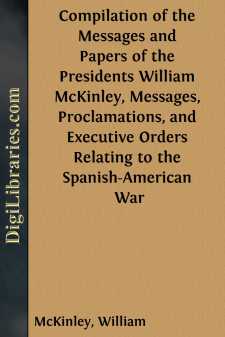Categories
- Antiques & Collectibles 13
- Architecture 36
- Art 48
- Bibles 22
- Biography & Autobiography 813
- Body, Mind & Spirit 142
- Business & Economics 28
- Children's Books 14
- Children's Fiction 11
- Computers 4
- Cooking 94
- Crafts & Hobbies 4
- Drama 346
- Education 46
- Family & Relationships 57
- Fiction 11829
- Games 19
- Gardening 17
- Health & Fitness 34
- History 1377
- House & Home 1
- Humor 147
- Juvenile Fiction 1873
- Juvenile Nonfiction 202
- Language Arts & Disciplines 88
- Law 16
- Literary Collections 686
- Literary Criticism 179
- Mathematics 13
- Medical 41
- Music 40
- Nature 179
- Non-Classifiable 1768
- Performing Arts 7
- Periodicals 1453
- Philosophy 64
- Photography 2
- Poetry 896
- Political Science 203
- Psychology 42
- Reference 154
- Religion 513
- Science 126
- Self-Help 84
- Social Science 81
- Sports & Recreation 34
- Study Aids 3
- Technology & Engineering 59
- Transportation 23
- Travel 463
- True Crime 29
Compilation of the Messages and Papers of the Presidents William McKinley, Messages, Proclamations, and Executive Orders Relating to the Spanish-American War
by: William McKinley
Description:
Excerpt
William McKinley
William McKinley, the twenty-fifth President of the United States, was born in Niles, Trumbull County, Ohio, January 29, 1843. His ancestors on the paternal side, who were Scotch-Irish, came from Scotland and located in Pennsylvania. His great-grandfather, David McKinley, after serving in the Revolution, resided in Pennsylvania until 1814, when he went to Ohio, where he died in 1840, at the age of 85. The grandmother of the President, Mary Rose, came from a Puritan family that fled from England to Holland and emigrated to Pennsylvania with William Penn. The father of the President, William McKinley, sr., was born in Pine Township, Mercer County, Pa., in 1807, and married Nancy Campbell Allison, of Columbiana County, Ohio, in 1829. Both the grandfather and father of the President were iron manufacturers. His father was a devout Methodist, a stanch Whig and Republican, and an ardent advocate of a protective tariff. He died during his son's first term as governor of Ohio, in November, 1892, at the age of 85. The mother of the President passed away at Canton, Ohio, in December, 1897, at the advanced age of 89. William McKinley was educated in the public schools of Niles, Union Seminary, at Poland, Ohio, and Allegheny College, at Meadville, Pa. Before attaining his majority taught in the public schools. At the age of 16 became a member of the Methodist Episcopal Church. At the beginning of hostilities in the War between the States Mr. McKinley, who was a clerk in the Poland post-office, volunteered his services, and on June 11, 1861, was enlisted as a private in the Twenty-third Ohio Volunteer Infantry. Participated in all the early engagements in West Virginia, and in the winter's camp at Fayetteville received his first promotion, commissary-sergeant, on April 15, 1862. In recognition of his services at Antietam, Sergeant McKinley was made second lieutenant, his commission dating from September 24, 1862, and on February 7, 1863, while at Camp Piatt, he was again promoted, receiving the rank of first lieutenant. In the retreat near Lynchburg, Va., his regiment marched 180 miles, fighting nearly all the time, with scarcely any rest or food. Lieutenant McKinley conducted himself with gallantry, and at Winchester won additional honors. The Thirteenth West Virginia Regiment failed to retire when the rest of Hayes's brigade fell back, and, being in great danger of capture, the young lieutenant was directed to go and bring it away, which he did in safety, after riding through a heavy fire. On July 25, 1864, at the age of 21, McKinley was promoted to the rank of captain. The brigade continued its fighting up and down the Shenandoah Valley. At Berryville, Va., September 3, 1864, Captain McKinley's horse was shot from under him. Served successively on the staffs of Generals R.B. Hayes, George Crook, and Winfield S. Hancock, and on March 14, 1865, was brevetted major of United States Volunteers by President Lincoln for gallantry in the battles of Opequan, Cedar Creek, and Fishers Hill....




